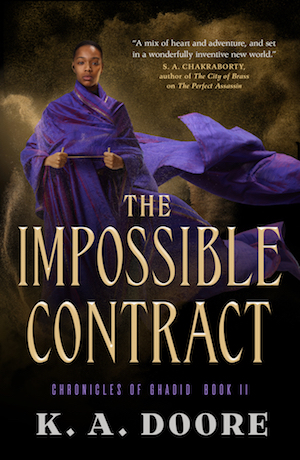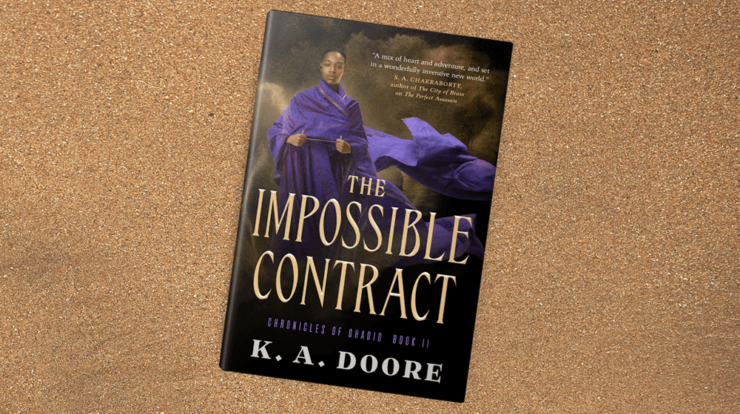I’ve been reading less in the last few months. Forced to take things more slowly, I’ve found myself more aware of my choices. I continue to gravitate towards books that both star women and are comfortably queer (as opposed to the queer relationship being a point of high stakes, high drama, and high tension). It’s reassuring that these days, there’s actually options, so that I can leave the high stakes/high drama queerness for a point at which I feel capable of enjoying it. I mean, I’ve been looking forward to Natasha Ngan’s Girls of Storm and Shadow and K. Arsenault Rivera’s The Warrior Moon since this time last year, but damn those characters are stressful.
Fortunately, I have K.A. Doore’s The Impossible Contract to keep me company. Assassins making poor life choices are more entertaining than stressful.
Thana’s a young woman with a lot to live up to. Her mother is the Serpent, most famous (or infamous) of the desert city of Ghadid’s secretive clan of assassins, and Thana’s grown up in her shadow. She’s ambitious to be known in her own right among her peers. To that end, she accepts a contract on a dangerous foreign diplomat (and sorcerer): Heru, an arrogant and unlikable representative of the Empress who claims a contested dominion over Ghadid.
Buy the Book


The Impossible Contract
The assassins of Ghadid may kill people outside the law, but they have a strict code of ethics and are very careful about their contracts. And they have a strong loyalty to the safety of their home. Thana’s life is complicated when Heru is attacked by a rival sorcerer—one who can, apparently, send undead killers after both Thana and Heru. Further complicating matters is the presence of the healer Mo, who gets involved in their mutual undead problem. Thana likes Mo. A lot. Thana’s also lying to Mo. Again, a lot. When Heru heads back across the desert to the heart of the empire, to try to get to the bottom of the whole undead thing (and the potential threat of an ancient evil) Mo accompanies him. And Thana follows, too—initially only to try to finish her contract. But before long, she finds herself pushed into uncomfortable alliance with Heru—and still keeping secrets from Mo. (That’s not going to backfire at all.)
The Impossible Contract may have the world-changing threat of an epic fantasy, but structurally, it’s playing with the form and content of the adventure genre—not quite sword-and-sorcery, since it’s clear that sorcerers aren’t exactly part of Thana’s everyday life—but something a bit more matter-of-fact and more focused on the consequences to people and relationships than the traditional run of epic fantasy.
Doore has a gift for writing swift and clever action scenes. But also for character: Thana is fascinating and prickly, making some understandably terrible decisions. (You know when you look back at your undergraduate years from the vantage of a decade or more on, and the only explanation for some of your mates’ choices is that their brains weren’t done developing the consequences module yet? Those sorts of decisions.) Mo is just as interesting, and the conflict between her personal ethics and Thana’s adds an extra dimension to their growing relationship.
The Impossible Contract is, in publication and internal chronological order, the second volume in the Chronicles of Ghadid. But it features a largely different cast and different concerns to Doore’s debut, The Perfect Assassin, and stands alone very well—even if it builds on The Perfect Assassin‘s beginnings. I enjoyed it a hell of a lot, and I commend it to your attention.
Speaking of adventure fantasies (and queer ones), I’m not entirely sure that Barbara Ann Wright’s Not Your Average Love Spell is a good book, but it is an entertaining… romantic fantasy adventure comedy? (I’m not sure how to categorise its Venn diagram of subgenres, either.) Starring an agoraphobic witch; a bright, curious, talkative homunculus; an archivist/scholar with a revolutionary bent; a knight who—at least initially—believes wholeheartedly in her order’s mission to stamp out magic; and an invasion of genocidal warriors, Not Your Average Love Spell takes its characters on an entertaining ride and delivers all of them a happy ending. (Except for the genocidal warriors. Their happy ending would be terrible for everyone else.)
Liz Bourke is a cranky queer person who reads books. She holds a Ph.D in Classics from Trinity College, Dublin. Her first book, Sleeping With Monsters, a collection of reviews and criticism, was published in 2017 by Aqueduct Press. It was a finalist for the 2018 Locus Awards and was nominated for a 2018 Hugo Award in Best Related Work. Find her at her blog, where she’s been known to talk about even more books thanks to her Patreon supporters. Or find her at her Twitter. She supports the work of the Irish Refugee Council, the Transgender Equality Network Ireland, and the Abortion Rights Campaign.










